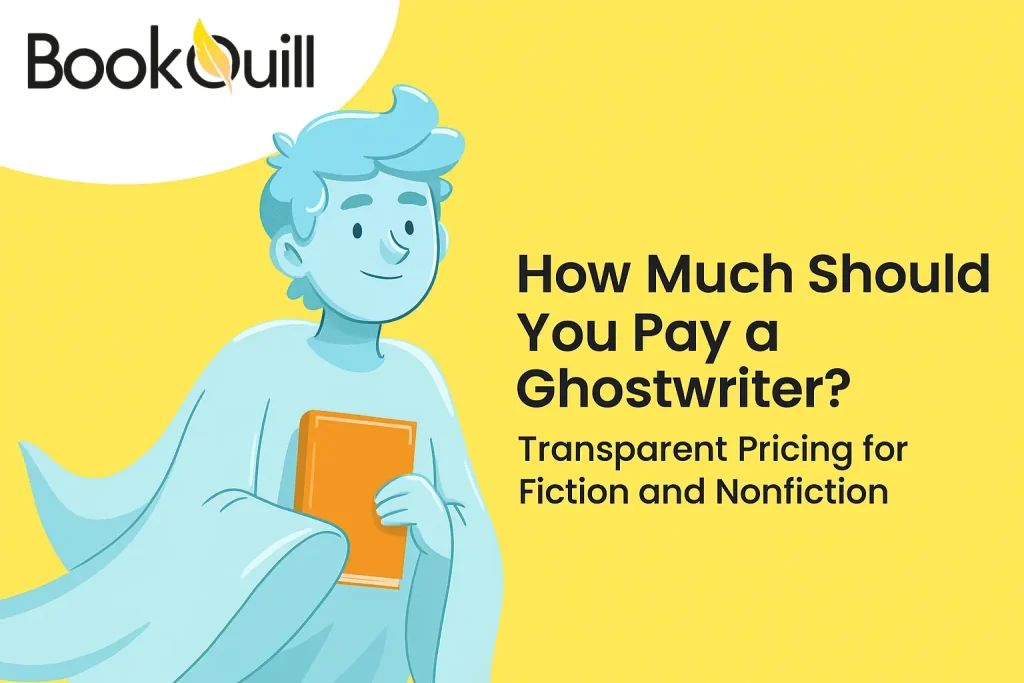Table of Contents
Explore Blogs
Trending on Ebook
How Much Should You Pay a Ghostwriter? Transparent Pricing for Fiction and Nonfiction

Don’t tell me you are one of those, too, who have picture ghostwriters as some shadowy figure standing in a candlelit attic. Well, if you are, you are clearly not alone. The truth is, the “ghost’ part is less paranormal and more practical. They are the invisible helping hands behind books you see in stores, credited to someone else. They make you look like a genius, and then they vanish quietly.
That vanishing act, however, comes at a price. And that’s where most people’s eyebrows shoot up. Ghostwriter pay can be anywhere from “That’s surprisingly affordable” to “Wait, do I need to sell my car?” The range is huge, and if you’re thinking about hiring one, you probably want straight answers.
And this blog is your complete guide. Here we will be talking about transparent pricing, what ghostwriters actually charge, why they charge it, how much ghostwriters make for fiction versus nonfiction, and what exactly you’re getting for your money.
You’ll also get insider insights from professional services and, yes, a few stories from clients who learned the hard way why “cheap” ghostwriting isn’t always a bargain.
So, let’s begin!
Key Takeaways
- Transparent ghost pricing helps you avoid hidden costs and ensures you know exactly what’s included before hiring a ghostwriter.
- Fiction and nonfiction projects require different skill sets, timelines, and budgets, and the charges depend on those differences.
- Quality professional ghostwriting services are an investment that can increase your credibility, brand, and long-term opportunities.
- Extremely cheap offers often lead to poor quality and costly rewrites.
- The right ghostwriter is the one who matches your budget to your goals and negotiates respectfully.
What’s a Ghostwriter and What Do They Do?
Here’s the thing: a lot of people think hiring a ghostwriter means you’re paying someone to “just write a book.” Like you hand them an idea like “It’s about a talking cat who solves crimes,” and then they disappear for a few weeks and come back with a great manuscript.
Honestly, if only it were that simple!
A ghostwriter is equal parts writer, researcher, interviewer, project manager, and even an occasional therapist. They don’t just put words on a page. They become your creative twin. That means they have to develop your idea from a seed into a complete marketable concept. Research like their lives depend on it, be it historical events, industry stats, or what life was really like in 18th-century France. And interview you to get the essence of your story, along with your tone, voice, and flow. And let’s not forget the revision, editing, and refining part, while also keeping you on track with timelines, updates, and gentle reminders.
That’s why ghost pricing isn’t “mysterious,” it’s a reflection of how much time, skill, and energy this process demands. A good ghostwriter sells the right words, arranges them in the right order, with the right emotional impact.
In other words, they are invisible, but they are everywhere in your book.
The Big Question: How Much Should You Pay a Ghostwriter?
Let’s skip the suspense. You came here for numbers, so here they are.
Most ghostwriters use one of four main pricing structures. First, charging per word can range anywhere from $0.10 for entry-level work to $3 for top-tier. Whereas, per page, it is usually between $250 and $500 based on standard formatting. Per project, which can start at around $5,000 for a short eBook and climb to $50,000 or more for a full-length manuscript, or hourly rates, typically $50 to $250 depending on experience and niche expertise.
Your actual ghostwriting pricing cost will also depend on the type of project you have in mind. Blog posts, for example, can run $50 to $500 each, while short eBooks (10,000–20,000 words) often fall in the $2,000 to $15,000 range. Full-length books (50,000–80,000 words) typically land between $20,000 and $80,000, and memoirs, with all their personal interviews and deep emotional investment, can range from $30,000 to $100,000+.
So… why the giant range? Because “ghostwriter” covers a huge spectrum, from the affordable ghost book writers just starting out, to the experienced industry pros who’ve hit the bestseller lists multiple times.
Experience and specialization drive cost. A ghostwriter who’s written six bestselling business books for Fortune 500 CEOs commands a higher rate than someone new to the industry. Similarly, if your project requires in-depth legal, medical, or historical research, you’re paying for that expertise.
And if you’re only looking at price, you risk falling into the trap of hiring affordable ghost writing companies that sound like a bargain but deliver something you wouldn’t put your name on. In ghostwriting, “cheap” often means “paying twice,” once for the bad draft and again for the rewrite.
So before you choke on the numbers, remember, this isn’t just about ghost writer salary. It’s about buying skill, voice-matching ability, and something that makes your book indistinguishable from something you spent years writing yourself.
Transparent Pricing – What It Means (and Why You Need It)
In the world of ghostwriting, “transparent pricing” is the opposite of the “It depends” answer you get when you ask about cost. Sure, rates do depend on length, complexity, and deadlines, but transparency means the ghostwriter actually tells you what’s included, what’s not, and how the number on the invoice came to life.
Think of it like a restaurant menu. You wouldn’t order a burger without knowing if fries and a drink come with it, right? Ghost pricing should work the same way.
Here’s what a transparent ghostwriting quote should include:
- Scope of work: Word count, number of chapters, and specific deliverables.
- Research expectations: Whether the ghostwriter is conducting interviews, fact-checking, or digging into archives.
- Revisions: How many rounds are included, and how additional ones are billed.
- Editing: Whether copyediting or proofreading is part of the package.
- Timeline: Start date, milestone dates, and completion date.
- Extra costs: Any possible add-ons, such as travel for interviews or transcription fees.
Why does this matter? Because vague pricing leads to vague work. I’ve seen clients hire affordable ghostwriting companies with a rock-bottom estimate, only to get hit with “extra” charges for things like outlining or editing.
However, transparent pricing also builds trust. If a ghostwriter walks you through exactly how much they charge and why, you can make an informed decision. You’ll know whether you are paying for premium expertise, lightning-fast turnaround, or simply a reliable collaborator.
Without transparency, hiring a ghostwriter can feel like using an Ouija board. You’re hoping for a good answer, but you’re not entirely sure who’s moving the planchette or what it’s going to spell out.
Fiction vs Nonfiction: Why the Price Tags Differ
One of the fastest ways to get a twisted quote from a ghostwriter is to treat fiction and nonfiction as if they’re the same job. They’re not. Not even close. Why?
Fiction ghostwriting is all about creative architecture. It’s about building an entire world from scratch, characters, dialogue, pacing, themes, and emotional arcs, all while making it sound like you dreamed it up. That means pulling from imagination, mastering genre conventions, and ensuring consistency from page one to “The End.” A single misplaced plot point in a thriller, or a character acting wildly out of character in a romance, can make the whole thing collapse like a poorly built Jenga tower.
Nonfiction ghostwriting, on the other hand, is like constructing a skyscraper. You’re working with hard facts, interviews, timelines, and research. Whether it’s a business leadership book, a memoir, or a how-to guide, every detail has to be credible, accurate, and clearly presented. This can mean digging through archives, interviewing multiple sources, and fact-checking every statistic.
Even the timelines can differ:
- Fiction projects might take longer if the plot is complex or the voice requires fine-tuning.
- Nonfiction can be faster if the subject matter is straightforward, but it can also drag on if research is deep or if the client’s availability for interviews is limited.
Fiction invents planets, nonfiction fact-checks yours. Both require skill, but the skill sets are different, and so are the costs. That’s why an experienced nonfiction ghostwriter who’s written for industry leaders might have a completely different rate than a genre-fiction specialist, and why it’s so important to hire for the right expertise.
So, if you’re talking to professional ghostwriting services, always be upfront about whether your book is fiction or nonfiction before asking for a quote. The clearer you are, the more accurate and fair your pricing will be.
Pricing for Fiction Ghostwriting
If nonfiction ghostwriting is about building skyscrapers, fiction ghostwriting is about building dreamscapes, the kind that keep readers up until 3 a.m., “Just one more chapter.” And that level of creativity comes with its own price tag.
What drives the cost for fiction?
Genre: A sweet, 40,000-word mystery is very different from a 150,000-word fantasy. Fantasy, sci-fi, and historical fiction often cost more because they require complex world-building and consistency across hundreds of pages. Romance might seem “simpler,” but pacing, chemistry, and emotional beats take just as much skill.
Word Count: Most full-length novels run 70,000–100,000 words. At a ghostwriter pay rate of $0.10–$3 per word, you’re looking at anywhere from $35,000 to $300,000. Shorter works like novellas are more affordable, but even then, quality writing takes time.
Voice Matching: Your ghostwriter is telling your story in your voice. That requires multiple interviews, sample chapters, and a lot of subtle rewriting to make it sound authentic.
Timeline: Need your book in six months instead of a year? Rush fees are common. Creativity can’t be microwaved, but deadlines are deadlines.
And yes, you can find affordable ghost book writers charging a few thousand dollars for a full novel. But here’s the trade-off! At that rate, you’re likely getting someone who’s inexperienced, rushed, or outsourcing parts of the work.
Pricing for Nonfiction Ghostwriting
Nonfiction ghostwriting is where creativity meets cold and hard facts. Instead of inventing characters and worlds, it’s about real people, real events, and real insights into a narrative that’s compelling and accurate. That’s why the pricing often reflects a different kind of workload than fiction.
What drives nonfiction costs?
Research Depth: Writing a how-to guide for home organization is not the same as writing on global finance. Complex subjects require weeks (sometimes months) of reading, data analysis, and source verification.
Interviews: Memoirs, biographies, and thought-leadership books often involve multiple rounds of interviews with you and sometimes your colleagues, friends, or family, too, to capture stories and details. Those conversations then need to be transcribed, organized, and shaped into a narrative.
Subject Expertise: Ghostwriters with backgrounds in law, medicine, finance, or other technical fields can command premium rates because their knowledge reduces the risk of errors.
Structure & Market Positioning: Nonfiction is about ensuring the content positions you as an authority. That means knowing the publishing market, reader expectations, and how to organize content for maximum impact.
And yes, as with fiction, you will find affordable ghostwriting companies offering to “do it for $3,000.” The problem? At that rate, the research is often minimal, fact-checking nonexistent, and the writing generic. If you’re putting your name and professional reputation on the cover, those are corners you can’t afford to cut.
Hourly vs Per-Word vs Project-Based Pricing
When it comes to ghost pricing, not all invoices are created equal. The way your ghostwriter charges can have as much impact on your budget as the rate itself. Let’s look at the three main models and when they work best.
Hourly Rates
Typical range: $50–$200+ per hour
This works well for smaller projects, consultation, or when you are testing the waters with a ghostwriter before moving on to a full manuscript. However, the risk is that without a clearly defined scope, hourly billing can balloon faster.
Per-Word Rates
Typical range: $0.10–$3+ per word
This is popular because it’s straightforward. You know exactly what you’re paying for each word on the page. However, the downside is that, if the writer is paid purely by word count, there’s a (rare but real) temptation to pad the text. And nobody wants their 50,000-word book turned into 80,000 words of filler just to increase the bill.
Project-Based Rates
Typical range: $5,000–$250,000+ depending on complexity, length, and profile.
This is often the most comfortable option for full-length books. You agree on a fixed price for the agreed deliverables, timelines, and revisions. The clarity helps avoid invoice shock later, and professional ghostwriting services will outline exactly what’s included.
So, Which is Best?
For a whole book, project-based pricing usually wins. It’s predictable, easier to budget, and aligns incentives toward quality rather than hours or word count. Hourly can work for short-term consulting, and per-word is fine for smaller assignments like articles or short eBooks.
Conclusion
If there’s one thing I hope you take from this, it’s that hiring a ghost writing service isn’t about finding the cheapest way to fill pages. It’s about finding the right support to bring your vision to life, someone who can capture your voice, structure your ideas, and hand you a finished book you’re proud to put your name on.
With that being said, we know that transparent pricing is also important. It gives you the confidence to invest wisely, as it comes with no hidden fees and no post-project regrets. Also, remember that the prices mentioned above are subject to change. Market demand, a ghostwriter’s experience, project complexity, and even publishing trends can all influence rates over time, so treat these numbers as a guide, not a guarantee.
And if you’re aiming for bestseller lists or simply want a beautifully told story for your family, remember this: ghosts aren’t scary, but bad contracts and cheap shortcuts are.
But you don’t have to deal with them when you choose our professional ghostwriting services for your assistance. With us, you get the best writer, pay fairly, and watch your book go from idea to reality, without any haunting regrets.
Reach out to us today!
Frequently Asked Questions
What’s a ghost writer, and what do they do?
A ghostwriter is a professional who writes your book in your voice, handling everything from research to revisions while you take the credit.
How much do ghostwriters make for a full-length book?
Rates vary widely, depending on length, complexity, and the writer’s experience.
Why does fiction ghostwriting cost differently from nonfiction?
Fiction requires intensive creativity and world-building, while nonfiction often demands deep research, interviews, and fact-checking.
Are affordable ghostwriters worth hiring?
Some are, but extremely low rates often mean lower quality, missed deadlines, or costly rewrites.
What is transparent ghost pricing, and why is it important?
It’s clear and upfront pricing that outlines what’s included, helping you avoid hidden fees and misunderstandings.
About Author
Hi My name is Micheal Adams, When I am not watching horror movies and helping my kids with homework or reading my favorite fantasy/supernatural novels – I’m writing to guide aspiring authors. I focus on exploring and simplifying both the technical aspects and the often-overlooked details of book writing and publishing so I can empower new writers to climb the Amazon bestseller list and connect with more readers.




